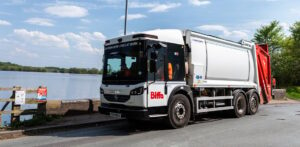ULEMCo, the hydrogen fuel specialist, has been awarded government funding with its partners to produce an optimised design for specialised hydrogen-fuelled vehicles. Working with Oxfordshire County Council (OCC) and its Fire and Rescue Service, ULEMCo will design the fuel cell electric powertrain configuration for zero-emission fire appliances.
HYdrogen Special Purpose Electric vehicle platform for Refuse collection and fire Trucks
Named HySPERT – for HYdrogen Special Purpose Electric vehicle platform for Refuse collection and fire Trucks – the work is planned to take eight months. The funding was secured from Innovate UK under the Transition to Zero Emission programme. In the project’s first stage, the partners will develop a deep understanding of the specific duty cycles for emergency service vehicles that need 24/7 readiness and enough energy on board for four to 40 hours of continuous running. Fire services use this type of vehicle in a variety of use scenarios, both urban and rural.
The work will involve creating a thorough understanding and a detailed model of the current energy requirement. It will include the energy needed to pump water for a minimum of four hours and the optimal range requirement. The test process will gather real-world data based on the performance of an OEM manufactured fuel cell throughout the project.
Optimised fuel-cell electric powertrain
ULEMCo will design the optimised fuel-cell electric powertrain for the Fire and Rescue Service. The key output is a full specification and detailed engineered design for a prototype vehicle. It is a precursor to the next stage of development, which will involve the physical building of the prototype.
The project comes as Oxfordshire County Council works towards becoming a net-zero carbon local authority by 2030 for its operational emissions.
‘We are excited to be working on this important initiative to plan the future of specialised utility vehicles such as fire tenders,’ said Amanda Lyne, Managing Director of ULEMCo. ‘Hydrogen has tremendous potential for enabling zero emission vehicles in the short term.’
Innovation
Councillor Pete Sudbury, OCC’s Cabinet Member for Climate Change Delivery & Environment, said: ‘Hydrogen could play an important role in our efforts to decarbonise, especially where battery-powered electrification is challenging in heavy-duty vehicles like fire engines. I’m delighted to partner with ULEMCo on this innovative feasibility study as an important step in exploring and advancing zero-carbon solutions. OCC’s Fire & Rescue Service will provide operational insight while the council’s unique Innovation Hub along with Climate Action team will work with ULEMCo to facilitate the project.’
Net-zero
OCC’s Chief Fire Officer Rob MacDougall said: ‘Oxfordshire County Council’s Fire and Rescue Service is committed to acting towards our net-zero target, and building on the work we have already done to move part of our fleet away from internal combustion engines. Heavy fire engines pose a particular challenge, and we feel that hydrogen-powered fuel cells can play a promising role in delivering on the county’s climate action ambitions.’
Alongside the study, the County Council will develop a plan for the hydrogen refuelling requirements across Oxfordshire Fire and Rescue Service. It fits with the broader agenda to build a hydrogen infrastructure across the county.




